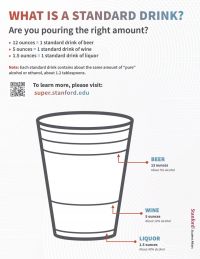Dear undergraduates,
We are writing this evening with concern about over-intoxication during the first two weekends of fall quarter. This has been a challenging start to our academic year and a dangerous trajectory. In this message, we’ll provide you with the facts we’ve collected since the start of the quarter, and we’ll ask everyone in our community to reflect on their personal and collective responsibility for a healthy living and learning environment free of alcohol and drug misuse. It takes all of us to make campus as safe as possible.
Here are the facts.
Ten undergraduates were transported to Stanford Hospital in September for alcohol poisoning. The number of frosh transports was consistent with years past even though this year’s frosh class is relatively large. However, more upperclass students were transported for alcohol poisoning in September 2021 than in the first weekends of 2016, 2017, 2018 and 2019. Ten cases overall may seem like a small number to you, but it’s worrisome to us: this is just what we can see and measure.
Alcohol poisoning is much more serious than a friend who is a little tipsy. Imagine what it would be like for you, or someone you love and respect, to be violently ill, vomiting, having seizures, having trouble breathing, and experiencing a heart rate so low that death is a possibility. Most concerning, we know from research that excessive binge drinking can have deleterious effects on cognitive function within the developing brain.

Know how much alcohol you’re drinking.
With another weekend just hours away, we ask that you think through your plans and expectations. That bottle of hard alcohol you have in your room? It could cause serious harm to you and your friends. If you choose to drink, if you choose to be present when friends drink, and especially if you choose to furnish alcohol to others, it is really important to understand the alcohol content of various alcoholic beverages.
In an emergency, call 9-1-1.
Students seeking medical treatment for themselves or others, or victim survivors who report a sexual assault, will not be subject to disciplinary action with respect to their alcohol or drug use. Now more than ever, we invite you to seek help early and often. Reach out to your RA, ETA, Resident Director or Resident Fellow for support. The Student Alcohol and Other Drugs Policy was drafted to help facilitate a path for students to get education, get help, and get care. Students can meet one-on-one with a Substance Abuse Educator or a Well-Being at Stanford Coach. As well, students can connect with CAPS or meet one-on-one with a dean in the Dean of Students Office.

Upcoming events
We know that you’re excited to be here. We ask that you remember your long-term goals after college. We call upon you to take care of yourselves, your friends, and everyone else around you. We know you’re looking for fun things to do, and we’ll be sharing more information on events and opportunities beginning with this Cardinal Nights event and continuing throughout the year.
Sincerely,
Susie Brubaker-Cole
Vice Provost for Student Affairs
Mona Hicks
Senior Associate Vice Provost and Dean of Students
Dr. Jim Jacobs
Associate Vice Provost and Executive Director, Vaden Health Services